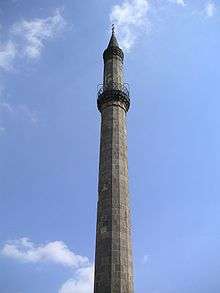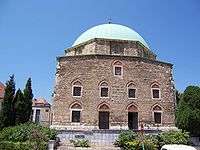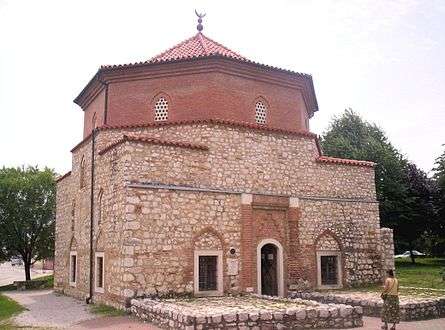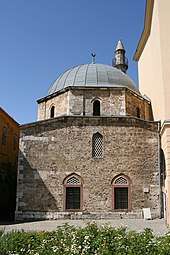Turks in Hungary
The Turks in Hungary, also referred to as Hungarian Turks, (Hungarian: Magyarországi törökök Turkish: Macaristan Türkleri) refers to ethnic Turks living in Hungary. The Turkish people first began to migrate predominately from Anatolia during the Ottoman rule of Hungary (1541-1699). A second wave of Ottoman-Turkish migration occurred in the late 19th century when relations between the Ottoman Empire and the Austro-Hungarian Empire improved; most of these immigrants settled in Budapest.[2] Moreover, there has also been a recent migration of Turks from the Republic of Turkey, as well as other post-Ottoman states (such as Bulgaria).[1]
| Total population | |
|---|---|
| "Ottoman Turkish": 1,565 (2001 census)[1] "Bulgarian-Turkish": 91 (2001 census)[1] Turkish citizens: 2,500 (2015 est.) | |
| Regions with significant populations | |
| Budapest, Pécs, Siklos | |
| Languages | |
| Turkish · Hungarian | |
| Religion | |
| Muslim |
History
Culture
Language
Most Hungarian Turks are bilingual and can speak both Turkish and Hungarian. Moreover, due to the Ottoman rule during the 16th-17th centuries, the Turkish language has also influenced greater Hungarian society; today, there are still numerous Turkish loanwords in the Hungarian language.[3]
| Turkish | Hungarian | English |
|---|---|---|
| Cebimde çok küçük elma var[4] | Zsebemben sok kicsi alma van[4] | There are many small apples in my pocket. |
Religion
The Turkish people, alongside the Arabs, make up the majority of the Muslim population in Hungary.[5] Several Ottoman-Turkish historical mosques are used by the Muslim community, including the Yakovali Hassan Pasha Mosque in Pécs, and the Malkoch Bey Mosque in Siklos.[6]
 The Eger minaret.
The Eger minaret. Mosque of Pasha Qasim in Pécs (now a church).
Mosque of Pasha Qasim in Pécs (now a church). Malkoch Bey Mosque in Siklos
Malkoch Bey Mosque in Siklos Yakovali Hassan Mosque in Pécs
Yakovali Hassan Mosque in Pécs
Population
According to the 2001 census, 2,711 inhabitants declared their language under the "Turkish language family", of which, the majority (57.73%) stated that they belonged to the "Ottoman Turkish" ethnicity (1,565).[1] Furthermore, 12 individuals declared to be "Turk" and 91 "Bulgarian-Turkish" (see Bulgarian Turks); the rest declared other Turkic ethnicities.[1] In the 2011 census 5,209 inhabitants declared themselves under "Török nyelvek" ("Turkish languages"); however, the publication does not show the distinction between different Turkic groups.[7]
In addition, there is also approximately 2,500 recent Turkish immigrants from Turkey living in Hungary.[8]
Organizations and Associations
In 2005 the Turkish community, alongside ethnic Hungarian Muslims, established "The Dialogue Platform".[9] By 2012, a new Turkish cultural association the "Gül Baba Turkish-Hungarian Cultural Association" was established in Szentendre, near Budapest.[9]
Notable people
- Zakaria Erzinçlioğlu, Britain's leading forensic entomologist[10]
- György Ekrem-Kemál, far-right politician[11]
- Can Togay, actor, film director, and creator of the Shoes on the Danube Bank Holocaust memorial[12]
See also
References
- Hungarian Central Statistical Office. "Factors of the nationality of the population based on affiliation with cultural values, knowledge of languages". Retrieved 2013-05-21.
- Melek, Çolak (2007), "Macaristan'da Müslümanlık ve İmam Abdüllatif Efendi (1909-1946)" (PDF), International Congress of Asian and North African Studies, 38: 1002
- Medgyes, Péter; Miklósy, Katalin (2005), "The Language Situation in Hungary", in Kaplan, Robert B.; Baldauf, Richard B. (eds.), Language Planning and Policy in Europe, Multilingual Matters, p. 29, ISBN 1853598119
- Belge, Murat (2014), Başka Kentler, Başka Denizler 1, İletişim Yayınları, ISBN 9789750500473
- Lederer, Gyorgy (2009), "Hungary", in Nielsen, Jorgen; Akgönül, Samim; Alibašic, Ahmet; Maréchal, Brigitte; Moe, Christian (eds.), Yearbook of Muslims in Europe, Volume 1, BRILL, p. 161, ISBN 9047428501
- Lederer 2009, 163.
- Központi Statisztikai Hivatal. "2011. ÉVI NÉPSZÁMLÁLÁS: 4. Demográfiai adatok" (PDF). p. 36. Retrieved 22 November 2017.
- Hurriyet. "Macaristan Türk yatırımcı bekliyor". Retrieved 2016-06-22.
- Pap, Norbet (2014), "Hungary", in Nielsen, Jorgen; Akgönül, Samim; Alibašic, Ahmet; Racius, Egdunas (eds.), Yearbook of Muslims in Europe, Volume 6, BRILL, p. 303, ISBN 9004283056
- "Zakaria Erzinçlioglu". The Telegraph. 2002. Retrieved 22 November 2017.
Zakaria Erzinçlioglu who has died of a heart attack aged 50, was Britain's leading forensic entomologist...Zakaria Erzinçlioglu was born on December 30 1951 in Hungary to parents of Turkish origin.
- Sørensen, Lene Bøgh; Eliason, Leslie C. (2002), Fascism, Liberalism, and Social Democracy in Central Europe: Past and Present, Aarhus University Press, p. 304, ISBN 8772887192,
Its leader Gyorgy Ekrem Kemál - a name inherited from the Turkish father executed in 1957
- "A Holocaust Memorial in Hungary created by a Turk". Salom. 2002. Retrieved 22 November 2017.
Born to a Turkish refugee family living in Budapest, in 1955, Can Togay (János)...